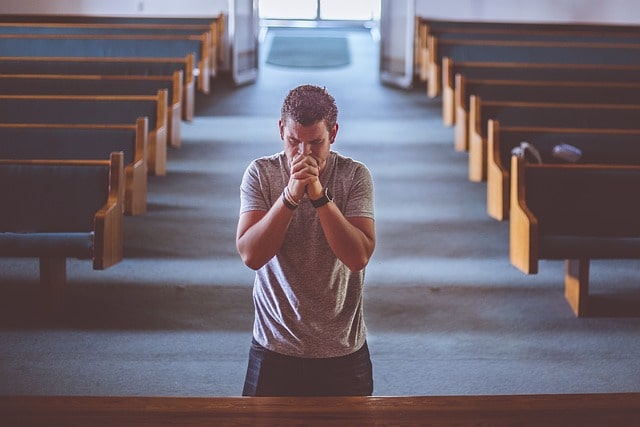
In the heart of every Christian is the desire for a more profound, more meaningful connection with the Lord. Prayer, the heartfelt conversation with our Heavenly Father, is the lifeline that draws us nearer to Him. We welcome you with open arms to our guide, ‘5 Powerful Sermon Outlines on Prayer’. Here, we will journey together through the landscape of prayer, guided by these inspiring sermon outlines on prayer.
Each sermon outline on prayer we present in this article aims to deepen our understanding of this spiritual discipline. They will walk you through the quiet whispers of a personal prayer to the echo of a congregation united in supplication, stirring hearts and igniting souls along the way.
No matter if you’re a seasoned preacher searching for a fresh perspective in sermon outlines on prayer or a new pastor preparing your first sermon, we are here to assist. We’ve sprinkled ‘sermon outlines on prayer’ throughout our article, always reminding us of the goal – to craft powerful, impactful, and engaging sermon outlines on prayer that will help your congregation forge a deeper connection with God. Let’s embark on this journey of spiritual growth together.
Sermon outlines on prayer
1. The Power of Personal Prayer
Objective of the Sermon
To illuminate the transformative power of personal prayer in an individual’s spiritual journey, fostering a deeper relationship with God.
Scriptures
Matthew 6:6; Psalms 42:1-2; Psalms 91:1-2
Introduction
Begin with the premise of prayer as a personal dialogue with God, emphasizing its role in spiritual growth and transformation. Reference Matthew 6:6, where Jesus encourages private prayer as a means of fostering intimate communication with the Father. Ask the congregation to reflect: How often do we prioritize personal prayer, and what are the barriers that hinder us from spending time in prayer?
Development
Transition into a discussion on Psalms 42:1-2. Draw parallels between the psalmist’s deep yearning for God, likened to a deer panting for water, and the believer’s desire for a deeper connection with God. Elaborate on how personal prayer quenches this spiritual thirst, promoting growth, transformation, and intimacy with God. Pose a reflective question: Can we relate to the psalmist’s yearning, and how does this longing shape our personal prayer life?
Dive deeper into the importance of personal prayer using Psalms 91:1-2. Discuss the security and peace we find in God’s presence, accessible through prayer. Elaborate on how prayer leads us into the refuge of the Most High, affirming our trust in Him as our fortress. Prompt the congregation to ponder: How has personal prayer played a role in our experiences of God’s protection and peace during challenging times?
Conclusion
Summarize by reiterating the power and importance of personal prayer in fostering a profound and intimate relationship with God. Encourage the congregation to cultivate a consistent prayer life, assuring them of the transformation and peace that comes from regular, intimate dialogues with the Father. Close with a prayer, inviting the Holy Spirit to guide each person into a deeper experience of personal prayer. End with a final reflective question: How can we make personal prayer a more integral part of our daily lives, and what steps can we take to achieve this?
2. The Unity in Communal Prayer
Objective of the Sermon
To highlight the importance of communal prayer in the unity and strength of the church community, and the power it holds in our collective spiritual journey.
Scriptures
Acts 1:14; Matthew 18:20; 1 Corinthians 12:26
Introduction
Begin with the concept of communal prayer and its role in fostering unity within the church. Highlight the Scripture in Acts 1:14 where the early believers dedicated themselves to prayer as a community. Ask the congregation to reflect: How do we currently view and engage in communal prayer, and how can we strive to deepen our collective prayer life?
Development
Move into an in-depth discussion of Matthew 18:20. Elaborate on the promise that where two or three are gathered in His name, Jesus is in their midst. Discuss the profound power and assurance in this promise and how communal prayer serves as a conduit for His presence.
Transition to 1 Corinthians 12:26, emphasizing how the church body shares in each other’s joys and sufferings. Connect this principle with communal prayer, elaborating on how it encourages empathy, shared support, and unity. Pose a reflective question: How do we respond to the joys and sorrows of our church community, and how can communal prayer enhance our sense of shared experiences?
Conclusion
Conclude by reaffirming the power of communal prayer in building unity and mutual support within the church community. Encourage the congregation to be proactive in communal prayer gatherings, reminding them of the unique power these shared spiritual moments hold. Close with a prayer for unity and an invitation to share in a moment of communal prayer. End with a final reflective question: What practical steps can we take to foster a deeper culture of communal prayer in our church community?
3. Intercessory Prayer: Standing in the Gap
Objective of the Sermon
To underscore the importance and impact of intercessory prayer, and our Christian responsibility to pray for others.
Scriptures
Ezekiel 22:30; 1 Timothy 2:1; James 5:16
Introduction
Begin with the concept of intercessory prayer and its role in our Christian walk. Refer to Ezekiel 22:30, where God sought an intercessor to stand in the gap for His people. Prompt the congregation to think: How often do we engage in intercessory prayer, and who are the people in our lives for whom we could be praying more earnestly?
Development
Transition into a deep exploration of 1 Timothy 2:1, emphasizing Paul’s urge to offer prayers, intercessions, and thanksgivings for all people. Discuss the transformative power of intercessory prayer, not only for those being prayed for but also for those who pray.
Dive into James 5:16, emphasizing the power and effectiveness of a righteous person’s prayer. Draw real-life examples to demonstrate the impact of intercessory prayer and inspire the congregation. Pose a reflective question: Can we recall instances where intercessory prayer has made a significant difference in our lives or the lives of others, and how did it transform the situation?
Conclusion
Summarize by reaffirming the vital role of intercessory prayer in our Christian responsibility towards others. Encourage the congregation to take up the mantle of intercession, standing in the gap for those in need. Close with an intercessory prayer for the church community, the nation, and the world at large. End with a final reflective question: How can we make intercessory prayer a more integral part of our daily prayer lives, and what steps will we commit to take towards this end?
4. The Prayer of Thanksgiving: Gratitude in All Circumstances
Objective of the Sermon
To emphasize the importance of giving thanks in prayer, no matter the circumstance, fostering a heart of gratitude and trust in God’s providence.
Scriptures
1 Thessalonians 5:16-18; Psalm 100:4; Philippians 4:6
Introduction
Start with the premise of giving thanks as a fundamental part of prayer, drawing from 1 Thessalonians 5:16-18. Ask the congregation to reflect: In our prayers, how often do we express gratitude, and how does this compare to requests and supplications we bring before God?
Development
Discuss Psalm 100:4, illustrating how thanksgiving is an entry point into God’s presence. Emphasize the transformative power of a grateful heart and how it shifts our focus from our problems to God’s goodness.
Transition to Philippians 4:6, and explore the juxtaposition of prayer, petition, and thanksgiving. Discuss how an attitude of gratitude, even when presenting our requests to God, creates peace and contentment. Pose a reflective question: How does integrating thanksgiving into our prayers affect our perspective on circumstances, and what changes can we observe when we maintain a heart of gratitude?
Conclusion
Conclude by re-emphasizing the role of thanksgiving in prayer and its power to transform hearts and minds. Encourage the congregation to practice gratitude in all circumstances, reminding them of God’s unchanging goodness. Close with a prayer of thanksgiving, inviting the congregation to voice their thanks to God. End with a final reflective question: What are some practical ways we can foster an attitude of gratitude in our daily prayer lives?
5. Praying in Faith: The Assurance of Things Hoped For
Objective of the Sermon
To highlight the essential role of faith in prayer, emphasizing how faith can amplify our prayers and align us with God’s will.
Scriptures
Hebrews 11:1; Mark 11:24; James 1:6-7
Introduction
Begin with the concept of faith in prayer as portrayed in Hebrews 11:1, defining faith as the assurance of things hoped for. Prompt the congregation to reflect: How does our level of faith influence our prayer life, and how confident are we in the unseen promises of God?
Development
Delve into Mark 11:24, emphasizing Jesus’ teaching on the necessity of believing in the answered prayer even before it has materialized. Discuss how this principle shapes our expectations in prayer and influences our spiritual perspective.
Transition to James 1:6-7, reinforcing the message of praying with unwavering faith. Address the hindrances and doubts that may affect the effectiveness of our prayers. Discuss practical ways to strengthen faith, such as spending time in God’s word, recalling past answered prayers, and sharing faith-building testimonies. Pose a reflective question: How has our faith been tested in the past, and how did it impact our prayer life and relationship with God?
Conclusion
Conclude by re-emphasizing the importance of praying in faith, underscoring that faith is not merely about receiving what we ask for, but aligning ourselves with God’s will. Encourage the congregation to foster a deeper faith through a persistent, hopeful, and trusting prayer life. Close with a prayer for increased faith, inviting the congregation to make a personal commitment to trust God more in their prayers. End with a final reflective question: What are some steps we can take to cultivate a faith-filled prayer life, trusting in God’s promises even when they seem far off?
As we conclude this exploration into the rich tapestry of prayer, it’s my prayer that you’ve been inspired, equipped, and emboldened to dive deeper into your own dialogue with God. Remember, each prayer—whether it’s personal or communal, intercessory or thankful, faith-filled or a desperate plea for faith—it’s a powerful conversation with our Heavenly Father who cherishes your voice and desires your heart.
May your journey be filled with divine encounters and transformative moments that draw you closer to the heart of God. May the power of prayer become more real in your life as you continue to explore and engage with it. And above all, remember that prayer is not just about changing circumstances but more importantly, about changing us and aligning us with God’s perfect will.


